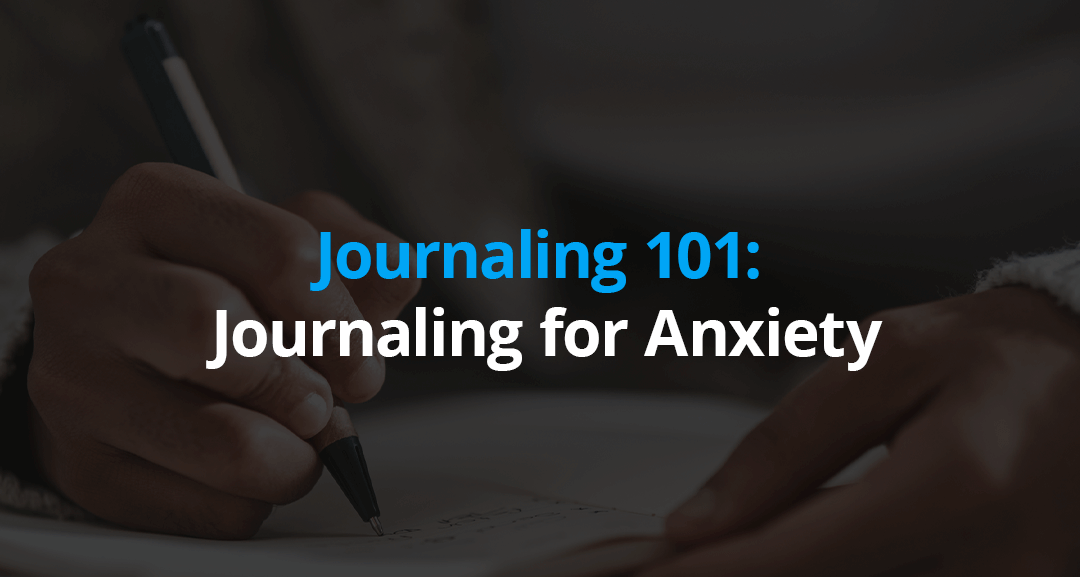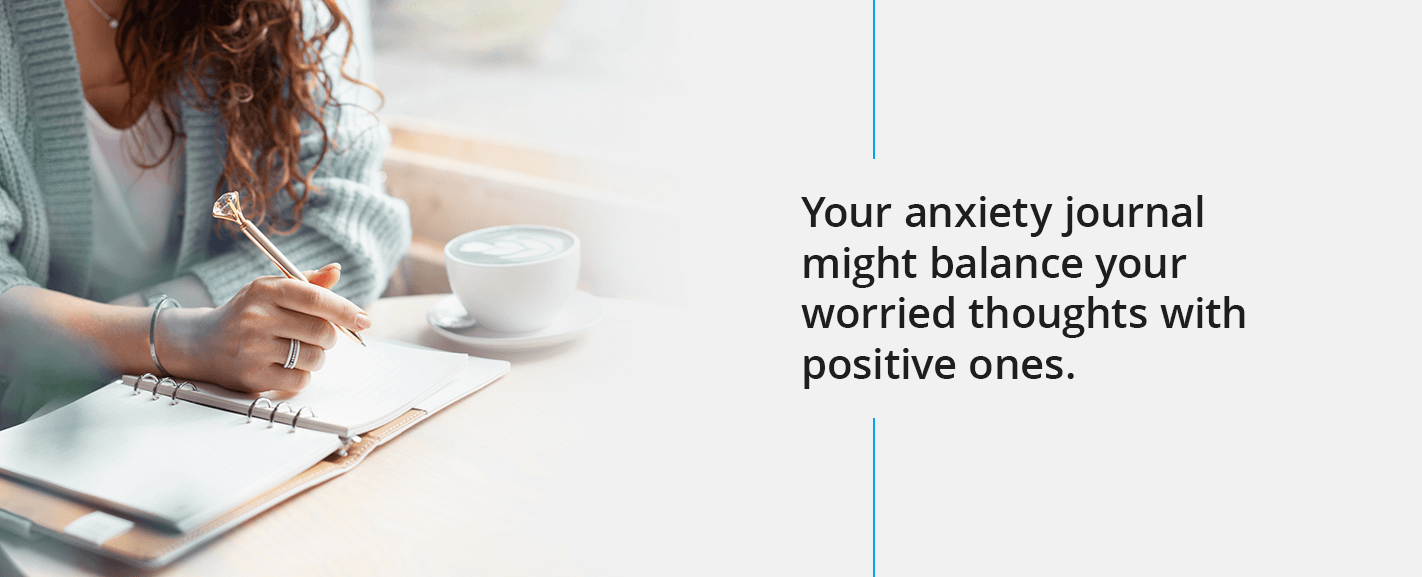Having anxiety or feeling worried often doesn’t have to interfere with your daily life. You can untangle your thoughts and let out your feelings through journaling for anxiety disorders. There are many ways you can make journaling unique and fun every time you sit down to do it, whether that be daily, weekly or monthly. That way, you can tailor your journaling experience to what’s special about you and your needs.
How Journaling Helps Cope With Anxiety
Journaling is a healthy coping mechanism, which means it’s an activity that allows you to express yourself without fear of negative consequences. Because of this, journaling can be an effective way to manage your mental health. More specifically, journaling can help you cope with depression, reduce stress and manage anxiety. Journaling helps you address and manage anxiety by:
- Engaging in positive self-talk
- Getting out your thoughts and worries
- Identifying negative behaviors and thoughts
- Tracking your anxiety symptoms so you can understand your triggers and ways to handle them
- Prioritizing your concerns, fears and problems
12 Ways to Start Journaling
If you’ve never journaled before or aren’t sure how to journal for anxiety, you might not know where to begin. Start your anxiety journaling habit with these suggestions:
1. Choose What to Journal In
Having a dedicated anxiety journal can help you keep your thoughts in one place. Instead of scribbling thoughts in a planner or on scrap paper, consider getting a notebook specifically to journal in. You can also journal digitally if you’d rather — just keep everything in one document or folder to look back on.
2. Choose When to Journal
Anxiety journaling might suit your needs better at different times of the day or the week. You could write about your thoughts on Sunday evening as you go into a new week, or you could journal every morning to think ahead to your day. Try different times and schedules to see what works for you, then try to stick to a routine to build the habit.
3. Set a Timer
You might feel like you don’t have enough time in your busy schedule to sit down and journal. But you don’t need to dedicate an hour — or even half an hour — to anxiety journaling. Five to 15 minutes might be enough to answer a prompt or get your thoughts down. Write what’s on your mind until the timer goes off, and give yourself more time if you need it.
4. Date Your Entries
Labeling your journal with the day and even the time can help you track patterns later on. Maybe you feel more anxious on Monday mornings because it’s the start of a new week. With that information, you can take steps to relax during those more anxious times and even journal about what you did and if it helped.
5. Follow Journal Prompts for Anxiety
Your anxiety journal might balance your worried thoughts with positive ones, depending on what you feel when you’re writing. If you aren’t sure where to begin, consider focusing on a prompt or two for anxiety and depression, like:
- This week, how has your anxiety or depression kept you from achieving your goals?
- Brainstorm a list of fun activities that uniquely appeal to you as ways to manage your stress. Add three of these activities to your schedule for this week.
- Fill in the following sentence about your feelings for the day: The last time I felt this way, I….
- Think about what the perfect day would look like for you and write a schedule for it. Try to incorporate some of the activities on this list into your week.
- What are three things that cause you anxiety? What are two ways you can deal with each of these triggers when they pop up?
- Write three wonderful characteristics that you have that you wish others knew about. How could you show off these characteristics more to others?
6. Follow Journal Exercises for Anxiety
Similar to prompts, you can set up your anxiety journal to follow a specific format every day. You can find a guided journal for anxiety or make your own. Consider writing these three points and answering them based on your experiences:
- Situation: What did your day or week have in store for you?
- Thoughts: How did you feel about what happened?
- Anxieties: What about the situation made you feel worried? Did you take steps to manage those anxieties?
7. Keep Your Journal Accessible
You’ll use your journal more if it’s somewhere you see it every day. Consider keeping it on your desk or a nightstand. You can even open up a note through your phone to make entries while you’re out and about. This will ultimately help you write down your thoughts when they are fresh in your mind.
8. Keep Your Journal Private
Anxiety journaling can be hard to break into if you overthink what you write. Take comfort in the fact that your journal is private. You might share your anxieties with your therapist or discuss anxiety journaling strategies with them, but overall, your journal is for you.
9. Try Freewriting
When you freewrite, you let your thoughts flow onto the page without stopping. If your anxiety often sets you on a thought spiral, getting ideas onto paper can help get them out of your mind. Try not to be too worried about spelling, syntax or grammar, either. You want journaling to be relaxing.
10. Reread What You Write
While it’s helpful to get your thoughts out, self-reflection can help you understand yourself and set goals. You can go over your past moods, experiences, emotions and memories so you can connect them to certain triggers and begin to understand yourself on a deeper level. You could even write a journal entry in response to a previous one. Do you feel you’ve changed since that entry? What have you been doing differently to address your anxieties and relieve your stress?
11. Be Honest
Your journal is not meant to impress anyone or be proof that you are working through your problems. It’s truly meant to be a tool that speaks for you and only you, so be honest with your journaling. When you’re honest with your journal, you’re ultimately being honest with yourself, which will clear away any clouds you may have surrounding your emotions.
12. Think of Journaling as Self-Care
Don’t think of journaling as a task you need to complete or a chore. Instead, view it as a way to help yourself improve and address your worries. You might even incorporate other self-care practices into your journaling time by putting on relaxing music or drinking some tea.
Learn More Ways to Cope With Anxiety With Merrimack Valley Psychological Associates
Coping with problematic anxiety can be a challenge to do alone. Here at Merrimack Valley Psychological Associates, we’re here to help you find healthy coping mechanisms to address your anxiety. Our compassionate clinicians are flexible to your unique needs, and we even offer teletherapy. If you want to learn more about us and how we can help you, give us a call at 978-482-7351 or fill out our online contact form.
Reviewed By
Dr. David Rainen, PsyD.
I am a licensed clinical psychologist with an extensive background treating a variety of different ages, situations, emotional and mental health disorders in individuals and their families. As part of my 10 year professional and training career in psychology, I have developed and refined my skills and approaches through my work in a variety of diverse settings including: hospitals, community outpatient facilities, college counseling centers, secure and unsecure inpatient/residential treatment programs, and therapeutic day schools.




